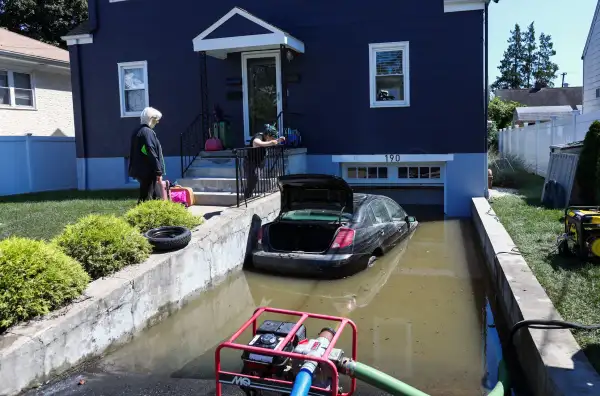What Insurance Will (and Won't) Cover if Your Home or Car Was Ruined by Hurricane Ida

Hurricane Ida is gone, and now comes its aftermath -- including a host of insurance questions and headaches.
Residents of the Gulf Coast, Northeast and mid-Atlantic are beginning to wrestle with how -- or even if -- their home and auto insurance policies cover the damage. That fallout is devastating. In addition to evacuations and more than two dozen deaths, insurance losses from Ida are expected to reach $18 billion, according to risk-modeling company Karen Clark & Co., and that figure doesn't include flooding claims under the National Flood Insurance Program.
As one of the biggest storms to hit the U.S. in years, Ida also raises questions -- regardless of where you live -- about the possible need to add or adjust your insurance coverage against rains and flooding.
After all, the Atlantic hurricane season is only half over, and the latest latest forecast from the National Oceanic and Atmospheric Administration predicts it will again be above-average in its severity, with a total of up to 20 named storms, including as many as 10 hurricanes.
Meanwhile, a report released Wednesday by the United Nations' weather agency, the World Meteorological Organization. says disasters caused by weather are hitting the globe five times more often and leading to seven times more damage than they did in the 1970s.
Here are five things to know both about how insurance protects you -- or not -- against the wind and water of a major storm, and what you can do to better insure yourself.
How water reaches your home means everything to your insurance coverage, or lack thereof. If rain falls directly onto or into your home, your home insurance protects you. So if Ida caused a tree to fall onto your roof, and the storm's intense rain saturated your upstairs bedroom, you should be made whole by your policy.
But homeowners insurance does not cover water that doesn't rain directly into your home. If Ida's rain caused a nearby river flooded its banks, or saturated the earth around your home and then gushed into your basement, the resulting damage is covered only if you have a flood insurance policy. Those policies are sold by either private companies or by FEMA, under the National Flood Insurance Program.
Flooding isn't only a coastal and rural threat
The evacuations due to Ida included one of 3,000 people living near a dam in Johnston, Pa. -- the site, about 200 miles from the Atlantic coast, of 1889's devastating Johnston Flood. And areas far inland also suffered widespread flooding in Louisiana and other states.
Nor are rural locales or cities along the Gulf Coast the most affected by flooding, necessarily. When FEMA identified the places most vulnerable to the impact of flooding, the top candidates included Philadelphia and New York City -- both of which suffered devastating floods from Ida.
Also, the unexpectedly huge magnitude of Ida's flooding reinforces how weather is becoming more unpredictable, in both incidence and severity. That's certainly the case for flooding in the eastern U.S., even in areas that may not previously have been affected, at least seriously.
The good news when it comes to flood insurance costs is that low past incidence of flooding tends to correspond with lower premiums for flood insurance. It's likely, then, that if you aren't in an area that's been prone to floods, you could get covered for well below the average premium of $1,800 or so for NFIP policies.
Your car should be covered
If your vehicles are damaged by a hurricane, including from flooding or a storm surges, you’re covered if you have what’s known as comprehensive coverage within your auto insurance policy. It’s the optional add-on that covers your car against such threats as theft, falling tree branches, and floods.
Fortunately, about 80% of car owners carry “comprehensive,” according to Mark Friedlander, Director of Corporate Communications with the Insurance Information Institute.
Hurricane wind damage is covered -- but often with a higher deductible
Wind is a key destructive force wrought by a hurricane, and Ida also brought strong winds that caused damage from fallen trees and lifted roofs. In almost all states, regular home insurance covers wind damage. However, in almost all coastal states, your regular deductible won’t apply once a storm warning is issued. And the hurricane deductible will almost certainly be higher and calculated differently than for other home perils.
As the Insurance Information Institute points out, for hurricane coverage, the regular fixed deductible for a home-insurance policy, typically $500 or $1,000, is usually supplemented by one based on a percentage of the home’s value. A hurricane deductible is different. Rather than being a flat sum, it's a percentage, and the base to which the percentage is applied is the property’s full value, rather than the cost of repairs.
If you lose your home to a hurricane, the cost of your deductible can become a major expense. Let’s say you owned a $600,000 coastal home that is flattened by wind in a hurricane and is covered by a policy with a 3% hurricane deductible — a figure that's in the middle of the typical range of 1% to 5%. You’d be on the hook to pay the first $18,000 of the home’s replacement cost.
Act fast to get flood insurance for the rest of hurricane season
If you don't carry flood coverage but want to get it, act fast if you want protection before the hurricane seasons ends in October. NFIP policies take 30 days from applying to kick in, and premiums are scheduled to go up for many properties as of October 1. Private flood insurance, though, can go into effect more quickly, in as little as 10 days or so.
More on Car Insurance
Money’s Top Picks
Car Insurance Reviews Learn More |
